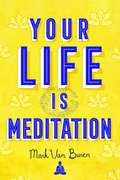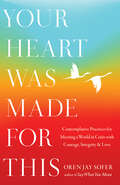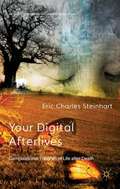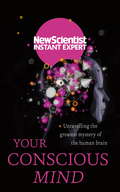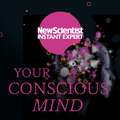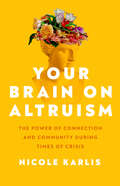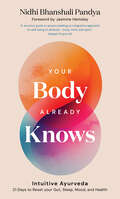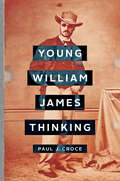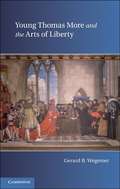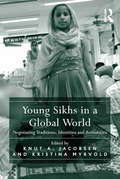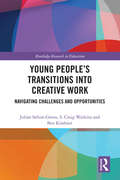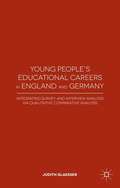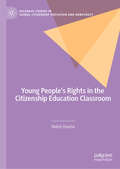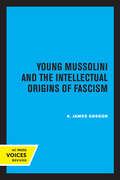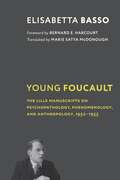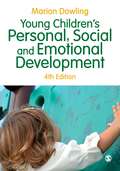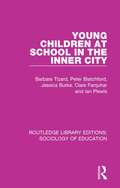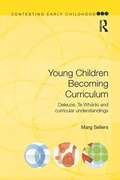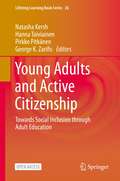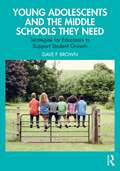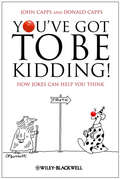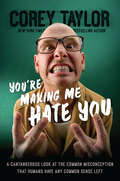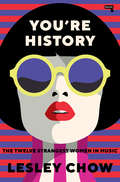- Table View
- List View
Your Life Is Meditation: Buddhist-inspired Stories And Reflections
by Mark Van BurenIn this mindfulness guide for a new generation, the author of A Fool&’s Guide to Actual Happiness provides accessible mindfulness teachings that reveal how simple it really is to entirely transform your life.This book&’s message is bold and clear: Your life is meditation—every moment and every circumstance can be a place of mindfulness practice and transformation. Your entire life is a path to awakening; nothing is too mundane, nothing is left out. Mark Van Buren excels at communicating in a simple and breezy fashion the nothing-special quality of spiritual practice and how mindfulness helps us make peace with life as it actually is. He leaves the reader feeling empowered, encouraged, and up for the task of living a life of at least just a little bit more freedom and peace.
Your Heart Was Made for This: Contemplative Practices for Meeting a World in Crisis with Courage, Integrity, and Love
by Oren Jay SoferA practical roadmap to cultivating the heart&’s capacity to face and transform our greatest challenges—like the climate crisis, oppression, anxiety, and burnout—from the bestselling author of Say What You Mean. Meditation teacher Oren Jay Sofer shares a pragmatic guide to living a life of meaning and purpose in a time of great social, environmental, and spiritual upheaval. Through touching stories, insightful reflections, and concrete instructions, Sofer offers powerful tools to strengthen our hearts and nourish the qualities that can transform our world. Each chapter guides you to cultivate a quality essential to personal and social transformation like mindfulness, resolve, wonder, and empathy. You&’ll learn ways to: · Find more choice and freedom in life · Strengthen focus, sustain energy, and accomplish goals · Identify burnout and take steps to renew yourself · Imbue your daily activities with clarity and vitality · Respond more effectively to collective challenges
Your Digital Afterlives
by Eric Charles SteinhartDigitalism is a philosophical strategy that uses new computational ways of thinking to develop naturalistic but meaningful ways of thinking about bodies, souls, universes, gods, and life after death. Your Digital Afterlives examines four recently developed and digitally inspired theories of life after death.
Your Conscious Mind: Unravelling the greatest mystery of the human brain (New Scientist Instant Expert)
by New ScientistWhat is this strange mental world that seems so essential to being human? The conscious mind brings together sensations, perceptions, thoughts and memories to generate the seamless movie of a person's life. It makes us aware of the world around us and our own self. How all this emerges from a kilogram of brain cells is one of the greatest unanswered questions. In Your Conscious Mind leading brain scientists and New Scientist take you on a journey through the mind to discover what consciousness really is, and what we can learn when it goes awry. Find out if we will ever build conscious machines, what animal consciousness can tell us about being human and explore the enigma of free will. ABOUT THE SERIESNew Scientist Instant Expert books are definitive and accessible entry points to the most important subjects in science; subjects that challenge, attract debate, invite controversy and engage the most enquiring minds. Designed for curious readers who want to know how things work and why, the Instant Expert series explores the topics that really matter and their impact on individuals, society, and the planet, translating the scientific complexities around us into language that's open to everyone, and putting new ideas and discoveries into perspective and context.
Your Conscious Mind: Unravelling the greatest mystery of the human brain (New Scientist Instant Expert)
by New ScientistA voyage through the mind to discover what consciousness really is, and what we can learn when it goes awry.What is this strange mental world that seems so essential to being human? The conscious mind brings together sensations, perceptions, thoughts and memories to generate the seamless movie of a person's life. It makes us aware of the world around us and our own self. How all this emerges from a kilogram of brain cells is one of the greatest unanswered questions. In Your Conscious Mind, leading brain scientists and New Scientist take you on a journey through the mind to discover what consciousness really is, and what we can learn when it goes awry. Find out if we will ever build conscious machines, what animal consciousness can tell us about being human and explore the enigma of free will. ABOUT THE SERIESNew Scientist Instant Expert books are definitive and accessible entry points to the most important subjects in science; subjects that challenge, attract debate, invite controversy and engage the most enquiring minds. Designed for curious readers who want to know how things work and why, the Instant Expert series explores the topics that really matter and their impact on individuals, society, and the planet, translating the scientific complexities around us into language that's open to everyone, and putting new ideas and discoveries into perspective and context.(P) 2017 Hodder & Stoughton Limited
Your Conscious Mind: Unravelling the greatest mystery of the human brain
by New ScientistWhat is this strange mental world that seems so essential to being human? The conscious mind brings together sensations, perceptions, thoughts and memories to generate the seamless movie of a person's life. It makes us aware of the world around us and our own self. How all this emerges from a kilogram of brain cells is one of the greatest unanswered questions. In Your Conscious Mind leading brain scientists and New Scientist take you on a journey through the mind to discover what consciousness really is, and what we can learn when it goes awry. Find out if we will ever build conscious machines, what animal consciousness can tell us about being human and explore the enigma of free will. ABOUT THE SERIESNew Scientist Instant Expert books are definitive and accessible entry points to the most important subjects in science; subjects that challenge, attract debate, invite controversy and engage the most enquiring minds. Designed for curious readers who want to know how things work and why, the Instant Expert series explores the topics that really matter and their impact on individuals, society, and the planet, translating the scientific complexities around us into language that's open to everyone, and putting new ideas and discoveries into perspective and context.
Your Brain on Altruism: The Power of Connection and Community during Times of Crisis
by Nicole KarlisIn an era when "self-care" often revolves around consumption and profit, a health and science journalist emphasizes the genuine health advantages of a culture of caring. Helping others can enhance our physical and mental well-being, boost resilience, and nurture a sense of fulfillment and connection beyond crises. In Your Brain on Altruism, health and science journalist Nicole Karlis delves into the science behind generosity and the benefits of fostering a culture of care for our health. She explores cutting-edge research on the sociology and psychology of altruism, revealing how acts of kindness during crises—such as COVID-19, natural disasters, and wars—inspire people to set aside differences and help one another. Through interviews with innovators creating infrastructures for social connection—from a former entrepreneur leading a social prescribing movement, to doctors prescribing volunteer work and acts of kindness—Karlis shows how we all can contribute to cultivating kindness. A powerful call for a culture of caring, this book urges us to see taking care of one another as a social strength. By embracing this mindset and viewing ourselves as stewards of kindness, we can combat the epidemic of loneliness and build a more compassionate and resilient society.
Your Body Already Knows: Intuitive Ayurveda 21 Days to Reset your Gut, Sleep, Mood, and Health
by Nidhi Bhanshali PandyaDiscover how to transform your life in just 21 days with the most accessible guide to Ayurveda ever written. This simple and practical book distils the profound principles of Ayurveda into an actionable plan for modern living, to benefit your sleep, gut, mood and more. Renowned author Deepak Chopra, MD, praises it as:"A succinct guide to anyone seeking an integrative approach to well-being at all levels – body, mind, and spirit." In this paradigm-shifting book, Nidhi Pandya unveils how to: Align your body with nature&’s circadian rhythms.Rebalance your health through diet, exercise, sleep, and mindset.Cultivate small rituals that connect you to the cycles of the world. Drawing on both her professional expertise as an Ayurvedic doctor and the profound legacy of her grandfather, a revered healer from India, Nidhi bridges ancient traditions with modern accessibility. Filled with interactive charts, tips, recipes, and lifestyle hacks, Your Body Already Knows is an empowering guide to achieving balance in today&’s fast-paced world. Whether you're a seasoned wellness enthusiast or a curious beginner, this book offers a practical, modern approach to Ayurveda that will help you unlock a healthier, happier life. Shift your health baseline. Your body already knows the way—are you ready to listen?
Young William James Thinking
by Paul J. CroceHow did youthful struggle give rise to the William James of philosophical legend and popularity?During a period of vocational indecision and deep depression, young William James embarked on a circuitous journey, trying out natural history field work, completing medical school, and studying ancient cultures before teaching physiological psychology on his way to becoming a philosopher. A century after his death, Young William James Thinking examines the private thoughts James detailed in his personal correspondence, archival notes, and his first publications to create a compelling portrait of his growth as both man and thinker.By going to the sources, Paul J. Croce’s cultural biography challenges the conventional contrast commentators have drawn between James’s youthful troubles and his mature achievements. Inverting James’s reputation for inconsistency, Croce shows how he integrated his interests and his struggles into sophisticated thought. His ambivalence became the motivating core of his philosophizing, the heart of his enduring legacy. Readers can follow James in science classes and in personal "speculations," studying medicine and exploring both mainstream and sectarian practices, in museums reflecting on the fate of humanity since ancient times, in love and with heart broken, and in periodic crises of confidence that sometimes even spurred thoughts of suicide. A case study in coming of age, this book follows the famous American philosopher's vocational work and avocational interests, his education and his frustrations—young James between childhood and fame. Anecdotes placed in the contexts of his choices shed new light on the core commitments within his enormous contributions to psychology, philosophy, and religious studies. James’s hard-won insights, starting with his mediation of science and religion, led to his appreciation of body and mind in relation. Ultimately, Young William James Thinking reveals how James provided a humane vision well suited to our pluralist age.
Young Thomas More and the Arts of Liberty
by Gerard B. WegemerWhat does it mean to be a free citizen in times of war and tyranny? What kind of education is needed to be a 'first' or leading citizen in a strife-filled country? And what does it mean to be free when freedom is forcibly opposed? These concerns pervade Thomas More's earliest writings, writings mostly unknown, including his 280 poems, declamation on tyrannicide, coronation ode for Henry VIII and his life of Pico della Mirandola, all written before Richard III and Utopia. This book analyzes those writings, guided especially by these questions: Faced with generations of civil war, what did young More see as the causes of that strife? What did he see as possible solutions? Why did More spend fourteen years after law school learning Greek and immersed in classical studies? Why do his early works use vocabulary devised by Cicero at the end of the Roman Republic?
Young Sikhs in a Global World: Negotiating Traditions, Identities and Authorities
by Knut A. Jacobsen Kristina MyrvoldIn attempting to carve out a place for themselves in local and global contexts, young Sikhs mobilize efforts to construct, choose, and emphasize different aspects of religious and cultural identification depending on their social setting and context. Young Sikhs in a Global World presents current research on young Sikhs with multicultural and transnational life-styles and considers how they interpret, shape and negotiate religious identities, traditions, and authority on an individual and collective level. With a particular focus on the experiences of second generation Sikhs as they interact with various people in different social fields and cultural contexts, the book is constructed around three parts: 'family and home', 'public display and gender', and 'reflexivity and translations'. New scholarly voices and established academics present qualitative research and ethnographic fieldwork and analyse how young Sikhs try to solve social, intellectual and psychological tensions between the family and the expectations of the majority society, between Punjabi culture and religious values.
Young People’s Transitions into Creative Work: Navigating Challenges and Opportunities (Routledge Research in Education)
by Julian Sefton-Green Ben Kirshner S Craig WatkinsExploring how formal and informal education initiatives and training systems in the US, UK and Australia seek to achieve a socially diverse workforce, this insightful book offers a series of detailed case studies to reveal the initiative and ingenuity shown by today’s young people as they navigate entry into creative fields of work. Young People’s Journeys into Creative Work acknowledges the new and diverse challenges faced by today's youth as they look to enter employment. Chapters trace the rise of indie work, aspirational labour, economic precarity, and the disruptive effects of digital technologies, to illustrate the oinventive ways in which youth from varied socio-economic and cultural backgrounds enter into work in film, games production, music, and the visual arts. From hip-hop to new media arts, the text explores how opportunities for creative work have multiplied in recent years as digital technologies open new markets, new scenes, and new opportunities for entrepreneurs and innovation. This book will be of great interest to researchers, academics and postgraduate students in the fields of youth studies, careers guidance, media studies, vocational education and sociology of education.
Young People’s Educational Careers in England and Germany
by Judith GlaesserThrough a comparative study of young people's educational careers in England and Germany, this book explores the range of influences which shape educational careers such as the individual talents and interests of young people, their social class and background, as well as school and country characteristics. Methodologically, the book develops a mixed methods approach that utilises Charles Ragin's increasingly popular Qualitative Comparative Analysis (QCA) to examine cross-case analyses of secondary survey data alongside within-case process-tracing analyses of interview data to establish causal understanding of educational careers. International comparison adds another dimension, exploiting the significant differences between the two countries' school and university systems. The book therefore offers both a contemporary account of young people's educational careers and decision-making as well as a practical contribution to ongoing debates concerning the establishment of causal andexplanatory knowledge in the non-experimental social sciences.
Young People's Rights in the Citizenship Education Classroom (Palgrave Studies in Global Citizenship Education and Democracy)
by Helen HannaThis book explores the rights held by young people in the citizenship education classroom in the divided societies of Northern Ireland and Israel. Against the backdrop of a long history of protracted conflict and division, the author analyses how international rights obligations are reflected in the contested citizenship education curriculum in secondary schools. Drawing upon extensive qualitative data as well as policy and curriculum documents, the author reveals that understandings of education rights can be oriented around three themes – minority group representation in the curriculum, dealing with difference through pedagogy, and preparing young people for life in a (divided) society. This can be mapped onto the 42-A rights framework where education should be ‘acceptable’ and ‘adaptable’. However, the variety of interpretations held by participants raises questions regarding the ‘universality’ of international frameworks for education rights, and the workability of such frameworks in the national and divided contexts. While the contexts of Northern Ireland and Israel have much in common, they are rarely compared: this book will show that their comparison is as relevant as ever, as issues of identity continue to affect everyday school life. This book will be of interest to citizenship and history education scholars, as well as those who are concerned with the application of international human rights law.
Young Mussolini and the Intellectual Origins of Fascism
by A James GregorThis title is part of UC Press's Voices Revived program, which commemorates University of California Press’s mission to seek out and cultivate the brightest minds and give them voice, reach, and impact. Drawing on a backlist dating to 1893, Voices Revived makes high-quality, peer-reviewed scholarship accessible once again using print-on-demand technology. This title was originally published in 1979.
Young Foucault: The Lille Manuscripts on Psychopathology, Phenomenology, and Anthropology, 1952–1955
by Elisabetta BassoIn the 1950s, long before his ascent to international renown, Michel Foucault published a scant few works. His early writings on psychology, psychopathology, and anthropology have been dismissed as immature. However, recently discovered manuscripts from the mid-1950s, when Foucault was a lecturer at the University of Lille, testify to the significance of the work that the philosopher produced in the years leading up to the “archaeological” project he launched with History of Madness.Elisabetta Basso offers a groundbreaking and in-depth analysis of Foucault’s Lille manuscripts that sheds new light on the origins of his philosophical project. She considers the epistemological style and methodology of these writings as well as their philosophical context and the scholarly networks in which Foucault was active, foregrounding his relationship to existential psychiatry. Young Foucault blurs the boundaries between biography and theory, exploring the transformations—and, at times, contradictions—that characterize the intellectual trajectory of a philosopher who, as Foucault himself put it, “turned to psychology, and from psychology to history.” Retracing the first steps of the philosopher’s intellectual journey, Basso shows how Foucault’s early writings provide key insights into his archaeological work of the 1960s. Assembling a vast array of archival sources—including manuscripts, reading notes, notes for lectures and conferences, and correspondence—this book develops a new and deeper understanding of Foucault’s body of work.
Young Children's Personal, Social and Emotional Development
by Marion DowlingYoung children’s personal, social and emotional development is of central importance to all those working in the Early Years. Offering thought-provoking questions and practical suggestions to help readers to reflect on and develop their own practice, this fourth edition of Marion Dowling’s much-loved book has been fully updated to include: Expanded coverage of key topics including independent thinking, living and learning with others, and dispositions for learning A new chapter on ‘Vulnerable Children and Fragile Families’, with sections on identifying risk, talking to families, and safeguarding and protection Guidance for working with parents in every chapter Updated links to the EYFS and a focus on two year olds. This is essential reading for all Early Years students and practitioners, and anyone working with or caring for young children.
Young Children's Personal, Social and Emotional Development
by Ms Marion DowlingYoung children's personal, social and emotional development is an area of ever-increasing interest to those working in the field of early childhood. This fully revised fourth edition of Marion Dowling's much-loved book has been updated to include: Current policies and frameworks, up-to-date research references and revised case studies Coverage of Troubled Families and 'Vulnerable Children', with sections on identifying risk, talking to families and safeguarding and protection A revised final chapter considering different methods of supporting children Updated links to EYFS and Teaching Standards (Early Years} and a focus on two year olds New guidance for working with parents Online material including links to journal articles and a video interview with the author With thought-provoking questions and practical suggestions to help readers to reflect on and develop their own practice, this book is essential reading for all Early Years students and practitioners.
Young Children at School in the Inner City (Routledge Library Editions: Sociology of Education #55)
by Clare Farquhar Peter Blatchford Barbara Tizard Jessica Burke Ian PlewisFirst published in 1988, this work reports on a major British study of children’s progress and behaviour in 33 infant schools. The research looks at children from nursery through to junior school and asks why some children had higher attainments and made more progress than others. Using observations not only in schools but also interviews with children and parents, the children’s skills on entering school were found to have an important effect on progress. In each school, black and white children, and girls and boys were studied, in order gauge whether gender or ethnicity were related to progress.
Young Children Becoming Curriculum: Deleuze, Te Whāriki and curricular understandings (Contesting Early Childhood)
by Marg SellersThis book contests a tradition and convention in educational thinking that dichotomises children and curriculum, by developing the notion of re(con)ceiving children in curriculum. By presenting an innovative research project, in which she worked with children to share their understandings of the internationally renowned Te Whāriki curriculum, Marg Sellers explores what the curriculum means to children and how it works, as demonstrated in games they played. In generating different ways for thinking, the author draws upon her work with the philosophical imaginaries of Gilles Deleuze and Felix Guattari, whose ideas shape both the content and the non-linear structure of this book. Topics covered include: Rhizomes, rhizo-methodology and rhizoanalysis; Plateaus; De~territorialising lines of flight; Dynamic spaces; The notion of empowerment. This assemblage of Deleuzo-Guattarian imaginaries generates ways for thinking differently about children’s complex interrelationships with curriculum, and opens possibilities for re(con)ceiving – both reconceiving and receiving – children’s understandings within adult conceptions of how curriculum works for young children. This book will be of interest to early childhood students, scholars and practitioners alike, also appealing to those interested in philosophical, theoretical and practical understandings of curriculum in general.
Young Adults and Active Citizenship: Towards Social Inclusion through Adult Education (Lifelong Learning Book Series #26)
by Pirkko Pitkänen George K. Zarifis Hanna Toiviainen Natasha KershThis open access book sheds light on a range of complex interdependencies between adult education, young adults in vulnerable situations and active citizenship. Adult education has been increasingly recognized as a means to engage and re-engage young adults and facilitate their life chances and social inclusion thus contributing to an active citizenship within their societal contexts. This collection of chapters dealing with issues of social inclusion of young people represents the first book to explicitly approach the complex interdependencies between adult education, young adults in vulnerable situations and active citizenship from the European perspective. Social exclusion, disengagement and disaffection of young adults have been among the most significant concerns faced by EU member states over the last decade. It has been increasingly recognised by a range of stakeholders that there is a growing number of young people suffering from the various effects of the unstable social, economic and political situations affecting Europe and its neighbouring countries. Young adults who experience different degrees of vulnerability are especially at risk of being excluded and marginalised. Engaging young adults through adult education has been strongly related to addressing the specific needs and requirements that would facilitate their participation in social, economic and civic/political life in their country contexts. Fostering the active citizenship of young people, both directly and indirectly, is an area where many AE programmes overlap, and this has become a core approach to integration.This book considers social, economic and political dimensions of active citizenship, encompassing the development of social competences and social capital, civic and political participation and the skills related to the economy and labour market. The cross-national consideration of the notions of vulnerability, inclusion and active citizenship underpins the complexity of translating these concepts into the national contexts of adult education programmes.
Young Adolescents and the Middle Schools They Need: Strategies for Educators to Support Student Growth
by Dave F. BrownThis textbook offers comprehensive information for middle level educators on understanding and addressing the unique challenges and opportunities in teaching students in grades 5–9. It illuminates the unique developmental processes of this population—physical, social, emotional, cognitive, and identity searches—and presents strategies for fostering their healthy overall growth.Drawing from neuroscience and psychological research, early chapters provide descriptions of middle schoolers’ developmental characteristics, while the remaining chapters delve into instructional, curricular, and assessment processes that match young adolescents’ needs. Together they create an extensive and distinct roadmap for designing effective schools for young adolescents. The personal thoughts of students including those of the Global Majority, those who are LGBTQIA+, and students who are immigrants are provided, with suggestions for how teachers should respond to their experiences and needs. An emphasis on equity and the importance of promoting racial, social, and gender justice in schools is also a focus throughout, as well as the encompassing effect of modern technology and the internet on adolescents’ learning and psyches.Ideal for courses in middle level education and young adolescent development, this book supports preservice teachers to be well prepared to meet their middle level students’ learning needs, both from a developmental and equitable lens. Inservice teachers working in the middle level will also gain an up-to-date perspective on young adolescent developmental trends and teaching strategies that best support their students.
You've Got To Be Kidding!: How Jokes Can Help You Think
by John Capps Donald CappsYou've Got to Be Kidding!: How Jokes Can Help You Think is a thoughtful and accessible analysis of the ways in which jokes illustrate how we think critically, and how the thinking process goes awry in everyday human situations Uses jokes to illustrate the various mistakes or fallacies that are typically identified and discussed in courses on critical reasoning Provides an effective way to learn critical thinking skills since jokes often describe real-life situations where it really matters whether a person thinks well or not Demonstrates how philosophy is actually very practical and clearly related to real- life human experiences Explains how developing good reasoning habits can make a real difference in all aspects of one’s life
You're Making Me Hate You: A Cantankerous Look at the Common Misconception That Humans Have Any Common Sense Left
by Corey TaylorIn the tradition of the late great George Carlin, New York Times bestselling author and lead singer of Slipknot and Stone Sour Corey Taylor sounds off in hilarious fashion about the many vagaries of modern life that piss him off. Whether it’s people’s rude behavior in restaurants and malls, the many indignities of air travel, eye-searingly terrible fashion choices, dangerously clueless drivers, and--most of all--the sorry state of much modern music, Taylor’s humor and insight cover civil society’s seeming decline--sparing no one along the way, least of all himself. Holding nothing back and delivered in Taylor’s inimitable voice, You’re Making Me Hate You is a cathartic critique of the strange world in which we find ourselves.
You're History: The Twelve Strangest Women in Music
by Lesley ChowRaucous, sensual and sublime: how twelve pioneering female artists rewrote the rules of pop.From Kate Bush to Nicki Minaj, from Janet Jackson to TLC and Taylor Swift, pop's greatest female pioneers are simply strange: smashing notions of taste and decorum, and replacing them with new ideals of pleasure. Instead of rehashing biographies, Lesley Chow dives deep into the music of these groundbreaking performers, identifying the ecstatic moments in their songs and finding out what makes them unique. You're History is a love letter to pop's most singular achievements, celebrating the innovations of women who are still critically underrated. It's a ride that includes tributes to Chaka Khan, Rihanna, Neneh Cherry, Sade, Shakespears Sister, Azealia Banks, and many more...
